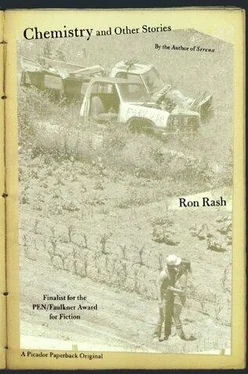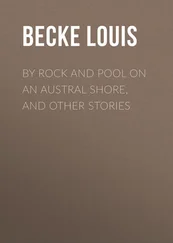Ron Rash
Chemistry and Other Stories
For my daughter,
CAROLINE
Their Ancient, Glittering Eyes
Because they were boys, no one believed them, including the old men who gathered each morning at the Riverside Gas and Grocery. These retirees huddled by the potbellied stove in rain and cold, on clear days sunning out front like reptiles. The store’s middle-aged owner, Cedric Henson, endured the trio’s presence with a resigned equanimity. When he’d bought the store five years earlier, Cedric assumed they were part of the purchase price, in that way no different from the leaky roof and the submerged basement whenever the Tuckaseegee overspilled its banks.
The two boys, who were brothers, had come clattering across the bridge, red-faced and already holding their arms apart as if carrying huge, invisible packages. They stood gasping a few moments, waiting for enough breath to tell what they’d seen.
“This big,” the twelve-year-old said, his arms spread wide apart as he could stretch them.
“No, even bigger,” the younger boy said.
Cedric had been peering through the door screen but now stepped outside.
“What you boys talking about?” he asked.
“A fish,” the older boy said, “in the pool below the bridge.”
Rudisell, the oldest of the three at eighty-nine, expertly delivered a squirt of tobacco between himself and the boys. Creech and Campbell simply nodded at each other knowingly. Time had banished them to the role of spectators in the world’s affairs, and from their perspective the world both near and far was now controlled by fools. The causes of this devolution dominated their daily conversations. The octogenarians Rudisell and Campbell blamed Franklin Roosevelt and fluoridated water. Creech, a mere seventy-six, leaned toward Elvis Presley and television.
“The biggest fish ever come out of the Tuckaseegee was a thirty-one-inch brown trout caught in nineteen and forty-eight,” Rudisell announced to all present. “I seen it weighed in this very store. Fifteen pounds and two ounces.”
The other men nodded in confirmation.
“This fish was twice bigger than that,” the younger boy challenged.
The boy’s impudence elicited another spray of tobacco juice from Rudisell.
“Must be a whale what swum up from the ocean,” Creech said. “Though that’s a long haul. It’d have to come up the Gulf Coast and the Mississippi, for the water this side of the mountain flows west.”
“Could be one of them log fish,” Campbell offered. “They get that big. Them rascals will grab your bait and then turn into a big chunk of wood afore you can set the hook.”
“They’s snakes all over that pool, even some copperheads,” Rudisell warned. “You younguns best go somewhere else to make up your tall tales.”
The smaller boy pooched out his lower lip as if about to cry.
“Come on,” his brother said. “They ain’t going to believe us.”
The boys walked back across the road to the bridge. The old men watched as the youths leaned over the railing, took a last look before climbing atop their bicycles and riding away.
“Fluoridated water,” Rudisell wheezed. “Makes them see things.”
ON THE FOLLOWING Saturday morning, Harley Wease scrambled up the same bank the boys had, carrying the remnants of his Zebco 202. Harley’s hands trembled as he laid the shattered rod and reel on the ground before the old men. He pulled a soiled handkerchief from his jeans and wiped his bleeding index finger to reveal a deep slice between the first and second joints. The old men studied the finger and the rod and reel and awaited explanation. They were attentive, for Harley’s deceased father had been a close friend of Rudisell’s.
“Broke my rod like it was made of balsa wood,” Harley said. “Then the gears on the reel got stripped. It got down to just me and the line pretty quick.” Harley raised his index finger so the men could see it better. “I figured to use my finger for the drag. If the line hadn’t broke, you’d be looking at a nub.”
“You sure it was a fish?” Campbell asked. “Maybe you caught hold of a muskrat or snapping turkle.”
“Not unless them critters has got to where they grow fins,” Harley said.
“You saying it was a trout?” Creech asked.
“I only got a glimpse, but it didn’t look like no trout. Looked like a alligator but for the fins.”
“I never heard of no such fish in Jackson County,” Campbell said, “but Rudy Nicholson’s boys seen the same. It’s pretty clear there’s something in that pool.”
The men turned to Rudisell for his opinion.
“I don’t know what it is either,” Rudisell said. “But I aim to find out.”
He lifted the weathered ladder-back chair, held it aloft shakily as he made his slow way across the road to the bridge. Harley went into the store to talk with Cedric, but the other two men followed Rudisell as if all were deposed kings taking their thrones into some new kingdom. They lined their chairs up at the railing. They waited.
Only Creech had undiminished vision, but in the coming days that was rectified. Campbell had not thought anything beyond five feet of himself worth viewing for years, but now a pair of thick, round-lensed spectacles adorned his head, giving him a look of owlish intelligence. Rudisell had a spyglass he claimed once belonged to a German U-boat captain. The bridge was now effectively one lane, but traffic tended to be light. While trucks and cars drove around them, the old men kept vigil morning to evening, retreating into the store only when rain came.
Vehicles sometimes paused on the bridge to ask for updates, because the lower half of Harley Wease’s broken rod had become an object of great wonder since being mounted on Cedric’s back wall. Men and boys frequently took it down to grip the hard plastic handle. They invariably pointed the jagged fiberglass in the direction of the bridge, held it out as if a divining rod that might yet give some measure or resonance of what creature now made the pool its lair.
Rudisell spotted the fish first. A week had passed with daily rains clouding the river, but two days of sun settled the silt, the shallow tailrace clear all the way to the bottom. This was where Rudisell aimed his spyglass, setting it on the rail to steady his aim. He made a slow sweep of the sandy floor every fifteen minutes. Many things came into focus as he adjusted the scope: a flurry of nymphs rising to become mayflies, glints of fool’s gold, schools of minnows shifting like migrating birds, crayfish with pincers raised as if surrendering to the behemoth sharing the pool with them.
It wasn’t there, not for hours, but then suddenly it was. At first Rudisell saw just a shadow over the white sand, slowly gaining depth and definition, and then the slow wave of the gills and pectoral fins, the shudder of the tail as the fish held its place in the current.
“I see it,” Rudisell whispered, “in the tailrace.” Campbell took off his glasses and grabbed the spyglass, placed it against his best eye as Creech got up slowly, leaned over the rail.
“It’s long as my leg,” Creech said.
“I never thought to see such a thing,” Campbell uttered.
The fish held its position a few more moments before slowly moving into deeper water.
“I never seen the like of a fish like that,” Creech announced.
“It ain’t a trout,” Campbell said.
“Nor carp or bass,” Rudisell added.
“Maybe it is a gator,” Campbell said. “One of them snowbirds from Florida could of put it in there.”
“No,” Rudisell said. “I seen gators during my army training in Louisiana. A gator’s like us, it’s got to breathe air. This thing don’t need air. Beside, it had a tail fin.”
Читать дальше












